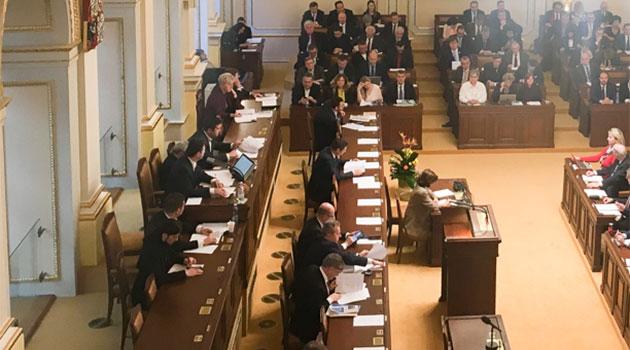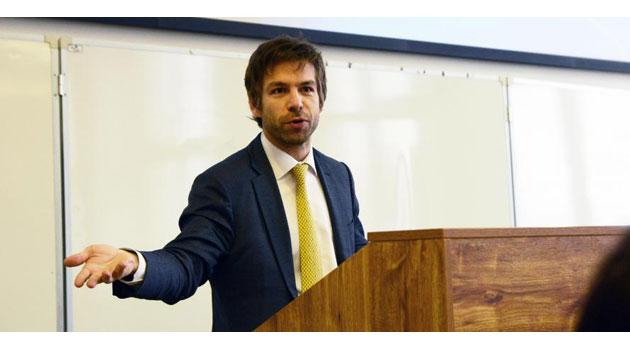Czech lower house rejects Senate amendments to bankruptcy bill, passes version unlikely to satisfy those who work with debtors

At the end of a bankruptcy proceedings, in some cases, the Czech courts will decide whether to grant debtors relief and they will have to pay their creditors monthly at least the amount required to remunerate the bankruptcy administrator. The Czech lower house made that decision when it rejected the Senate’s proposed changes to a bankruptcy bill and adopted its original version.
The upper chamber had proposed removing those conditions and opening up the opportunity for personal bankruptcy even to the poorest. The law is now going to the President for signature.
A broader circle of people should still be able to escape the debt trap now than before. The current condition requiring a debtor to be able to pay at least 30 % of his or her debt within five years in order to qualify for debt relief has been removed.
The bankruptcy bill is meant to make it possible for over-indebted persons to return to regular economic life. Many people subjected to collections proceedings work under the table because if they were to be officially employed, wage garnishment would leave them just a minimum of money.
Of the 184 MPs present for the vote, 62 voted in favor of the Senate’s form of debt relief. At least 93 votes were necessary for the Senate changes to be adopted by the lower house.
The Senate’s wording of the bill was not supported by MPs from the Association of Dissatisfied Citizens (ANO), the Civic Democratic Party (ODS), and the “Freedom and Direct Democracy” party (SPD). The original bill as drafted by the Chamber of Deputies was confirmed by 181 votes and no votes against.
Had the bill not been adopted, the current conditions for debt relief would have remained in effect. According to a map of collections proceedings from 2017, 9.7 % of the inhabitants of the Czech Republic, or 863 000 people, are involved in collections proceedings.
The situation in the Ústecký Region was the worst on that map, where almost one-fifth of the population are undergoing collections proceedings, followed by the Karlovy Vary Region, where 17 % of people are subject to collections. More than one-fifth of those living in the former administrative districts of Chomutov, Most, Sokolov and Ústí nad Labem are encumbered by collections.
In the version of the bill approved by the lower house, two options for debt relief are now available. The first assumes people will pay their creditors at least 60 % of their debts over three years.
The second option calls for debtors to pay at least 30 % of what they owe over five years. If they pay less, the court then decides on their debt relief.
In such cases, the court would have to acknowledge that the debtor has done his or her best to pay off the debts under the supervision of a bankruptcy administrator. It is exactly that condition that the Senate wanted removed as unnecessary and a further encumbrance – a proposal that was in accordance with the requests made by organizations working with overly indebted people.
Critics of the Senate proposal, however, objected that to accede to that request would be to practically announce an amnesty on debt repayment. The lower house version was supported during the discussion of the bill by Justice Minister Jan Kněžínek (for ANO), according to whom it is motivating for debtors and fair to creditors.
Debtors will be indirectly forced to join transparent economic processes and creditors will be guaranteed that at least part of the debts are paid, the Justice Minister said. On the other hand, MP Jan Farský (Mayors and Indpendents – STAN) said the adopted version means debtors will have to live for five years in a state of uncertainty as to whether they will actually be given debt relief at the end of the process.
The Senate version would have been more fair to creditors, debtors and the state itself, Farský said. According to MP Ondřej Veselý (Czech Social Democratic Party – ČSSD), the lower house wording of the bill is unfair because some debtors will never qualify for entry into the debt relief process.
MP Helena Langšádlová (TOP 09) pointed out that over-indebtedness does not just have economic impacts, but also political ones. This group of inhabitants, according to her, more frequently inclines toward extremism.
Pirates’ MP Mikuláš Ferjenčík also supported the Senate version of the bill, saying that overly indebted people become resigned to their fates and choose to live on welfare. MP Marek Výborný (Christian Democrats – KDU-ČSL) said he believed “The lower house version is more balanced. It is not a step backward, it is a significant move forward.”
MP Jan Bauer (ODS) called the lower house wording a compromise and said a bankruptcy law should not be about social support for debtors. One of the co- authors of the lower house bill, Patrik Nacher (ANO), warned, in association with the Senate’s proposed changes to personal bankruptcy and new regulations for providing consumer credit in particular, that it would not be desirable to create a “moral hazard” around the issue of credit in the future.
According to the approved version of the bill, senior citizens could have an easier time of debt relief. Such debtors could be debt-free after three years.
However, senior debtors would only be able to take advantage of such debt relief once in their lives. Changes will also be made to the order in which receivables related to debt must be satisfied.
So-called “accessory charges”, if their total amount exceeds the amount of the loan principal (such as fines, interest and penalties) will become subordinated to paying off the principal. The Government’s own bankruptcy bill originally proposed three options for debt relief.
The first proposal assumed debtors receiving relief after paying off half of their debts over three years, while the second proposed relief to those who paid off 30 % over five years. The third option counted on debt relief being granted after seven years without requiring the debtor to pay anything.
